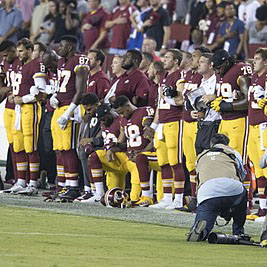Kneeling in protest or following the crowd?

Photo courtesy of Wikimedia Commons
As the very controversial national anthem boycotts continue at NFL games, people grow more and more divided on the issue as new players join the protest.
November 30, 2017
No country in the world has ever been so dedicated to personal freedoms as the United States. The freedoms our Constitution and laws guarantee are an essential part of living in the free world because they hold our nation together.
One such freedom that we possess is the ability to choose whether to stand for the national anthem or not, and this right has been heavily criticized lately due to the use of it by American athletes, especially football players.
These criticisms are understandable for the reason that people see kneeling during the national anthem as a display of disrespect, but the real issue here is that the original motivation for the protest has largely died out, and many protesters only continue for attention. At this point, the movement has become nothing but another dividing factor for Americans.
It may surprise you to learn that there’s a component of legal code in the United States that instructs citizens to stand for the national anthem. It’s true. So how is it that thousands of athletes across the country are taking a knee during the Star Spangled Banner these days and getting away with it without being punished?
Well, it’s because this isn’t a law in the sense that it’s illegal, it’s only a piece of advisement. United States legal code states that when the anthem plays, civilians “should face the flag and stand at attention with their right hand over the heart.” The key word here is “should.” While it isn’t a crime to defy this rule, it is legally proper to follow it.
But there’s a very good reason why this law doesn’t have any criminal punishments associated with it, and that’s the First Amendment. It’s well known to Americans that this amendment to the Constitution guarantees individual rights to different forms of freedom of expression, which is one of the most treasured liberties a person could have.
For this reason, I do not make the argument that it’s inherently wrong for people to boycott the national anthem.
However, in this recent trend of boycotts, which was popularized if not initiated by former San Francisco 49ers quarterback Colin Kaepernick, the once-present merit to the protest has been entirely lost to both bandwagon and controversy.
The original point of the anthem boycott was to draw attention to what many interpreted as an increase in abuse of black communities by the police. Regardless of if you agree with this interpretation or not, that entire issue has long since been buried under heaps of political arguments about the ethics/morality of disrespecting the anthem.
People have been so much more focused on this issue rather than Kaepernick’s intended point of discussion that the police brutality controversy is long gone in the eyes of the media and most Americans, so in this regard, the only thing the remaining anthem boycotters are doing is agitating the people who are proud of the anthem.
The anthem isn’t being shunned for purposes of raising awareness or drawing attention anymore. It’s being shunned because athletes and other participants have given into the pressure of their colleagues who have joined the trend, often for popularity and attention.
If all these people were so opinionated about police brutality, why didn’t they bother to show any care for it publicly before now?
Oh, I know why. It’s the “B” word. Bandwagon in sports, who would’ve guessed?
To summarize, I am opposed to this anthem protesting because it is no longer associated with any respectable movement. The only thing people who are still boycotting the national anthem are trying to raise awareness about is themselves.




